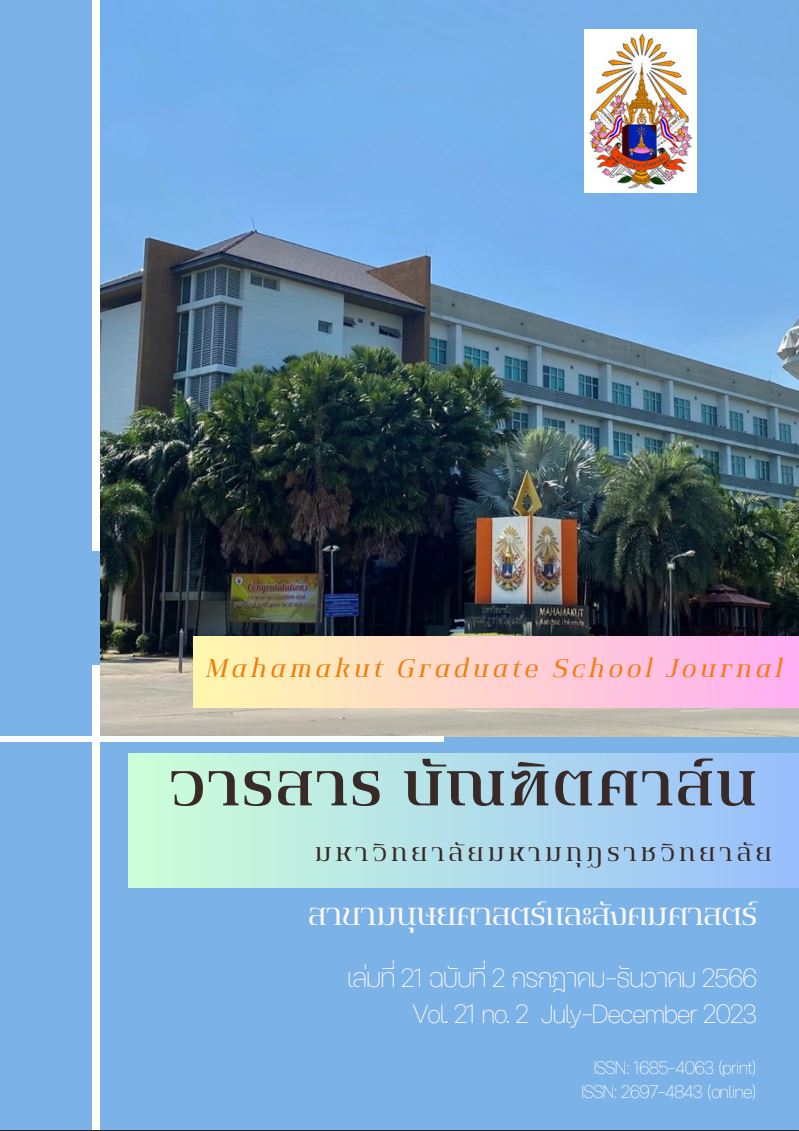การพัฒนาทักษะการบริหารงานบุคคลยุคดิจิทัล ตามหลักวุฒิธรรมของ ผู้บริหารโรงเรียนวิถีพุทธ ระดับประถมศึกษา จังหวัดเพชรบุรี
คำสำคัญ:
การพัฒนาทักษะการบริหารงานบุคคลยุคดิจิทัล, หลักวุฒิธรรม, ผู้บริหารโรงเรียนวิถีพุทธบทคัดย่อ
การวิจัยเรื่องมี มีวัตถุประสงค์ 1. เพื่อศึกษาสภาพทักษะการบริหารงานบุคคลของผู้บริหารสถานศึกษาโรงเรียนวิถีพุทธ 2. เพื่อศึกษาวิธีพัฒนาทักษะการบริหารงานบุคคลยุคดิจิทัล ตามหลักวุฒิธรรมของผู้บริหารสถานศึกษาโรงเรียนวิถีพุทธ และ 3. เพื่อเสนอวิธีการพัฒนาทักษะการบริหารงานบุคคลยุคดิจิทัล ตามหลักวุฒิธรรม ของผู้บริหารโรงเรียนวิถีพุทธ ระดับประถมศึกษา จังหวัดเพชรบุรี เป็นการวิจัยแบบผสานวิธีระหว่างการวิจัยเชิงปริมาณและเชิงคุณภาพ ใช้กลุ่มตัวอย่างครูโรงเรียนวิถีพุทธ จำนวน 312 คน โดยใช้สถิตวิเคราะห์ค่าเฉลี่ย ค่าส่วนเบี่ยงเบนมาตรฐาน และวิเคราะห์เนื้อหาจากการสัมภาษณ์จากผู้ทรงคุณวุฒิ
ผลการวิจัยพบว่า
- สภาพปัญหาทักษะการบริหารงานบุคคล ของผู้บริหารสถานศึกษา โรงเรียนวิถีพุทธ ระดับประถมศึกษา จังหวัดเพชรบุรี โดยภาพรวม และทุกด้าน อยู่ในระดับมาก ได้แก่ ด้านการประเมินผลการปฏิบัติงาน ด้านการพัฒนาบุคลากร ด้านการธำรงรักษาบุคคล ด้านการสรรหาและบรรจุแต่งตั้ง และด้านการวางแผนกำลังคนและกำหนดตำแหน่ง ตามลำดับความสำคัญ
- ผลการศึกษาวิธีพัฒนาการพัฒนาทักษะการบริหารงานบุคคลยุคดิจิทัล ตามหลักวุฒิธรรม ของผู้บริหารโรงเรียนวิถีพุทธ ระดับประถมศึกษา จังหวัดเพชรบุรี มีดังนี้ 1) สถานศึกษาควรจัดทำคู่มือการบริหารงานบุคคลให้สอดคล้องกับความต้องการของสถานศึกษา 2) ตั้งคณะกรรมการในการกำหนดคุณสมบัติ โดยนำเทคโนโลยีดิจิทัลมาประชาสัมพันธ์ในการรับสมัคร 3) มีเกณฑ์การประเมินการปฏิบัติงานให้เอื้อต่อการทำงาน และ 4) นำเทคโนโลยีมาสนับสนุนการบริหารจัดการให้กับบุคลากร
- วิธีการพัฒนาทักษะการบริหารงานบุคคลยุคดิจิทัลของผู้บริหารโรงเรียนวิถีพุทธ ระดับประถมศึกษา จังหวัดเพชรบุรี ตามหลักวุฒิธรรม มีวิธีการพัฒนาดังนี้
3.1 สัปปุริสังเสวะ (คบคนดี) เลือกผู้บริหารหรือผู้ทรงคุณวุฒิที่มีความรู้เชี่ยวชาญ ด้านการจัดทำแผนกำลังคนโดยนำเอาเทคโนโลยีดิจิทัลมาพัฒนากระบวนการสรรหาและการดำรงรักษาซึ่งบุคคลให้ปฏิบัติงานเพื่อความเจริญของสถานศึกษาต่อไป
3.2 สัทธัมมัสสวนะ (การฟังธรรม) ฟังคำแนะจากผู้มีความรู้เชี่ยวชาญเกี่ยวกับวิธีการพัฒนาแผนกำลังคน กระบวนการสรรหาหรือพัฒนาบุคคล ที่ได้ให้มีความรู้ที่ดี ผู้มีคุณธรรมเพื่อนำมาพัฒนาตนเอง และพัฒนาสถานศึกษา
3.3 โยนิโสมนสิการ (คิดถูกวิธี) สถานศึกษาต้องพิจารณาไตร่ตรองอย่างรอบคอบก่อนลงมือปฏิบัติตามแผนงานที่วางไว้เกี่ยวกับกำลังคนว่าควรจัดหาหรือนำเทคโนโลยีดิจิทัลระดับใด มาเป็นกระบวนการสรรหาหรือการพัฒนา เพื่อไม่ให้เกิดผลกระทบต่อสถานศึกษาในวันข้างหน้า
3.4 ธัมมานุธัมมปฏิบัต (การนำไปปฏิบัติ) การนำแผนกำลังคนตลอดถึงวิธีการสรรหาการธำรงรักษาไว้ซึ่งบุคคลให้ปฏิบัติหน้าที่ได้อย่างถูกต้องเหมาะสมและปฏิบัติหน้าที่อย่างมีคุณธรรมจริยธรรมที่เกิดจากการปฏิบัติงานการบริหารงานบุคคลยุคดิจิทัลต่อไป
เอกสารอ้างอิง
พระไตรปิฎกฉบับภาษาไทย เล่มที่ 21 พระสุตตันตปิฎกเล่มที่ 13 อังคุตตรนิกาย จตุกกนิบาต
กระทรวงศึกษาธิการ. พระราชบัญญัติระเบียบบริหารราชการกระทรวงศึกษาธิการ พ.ศ. 2546 ฉบับกฤษฎีกา (2546
, กรกฎาคม). ราชกิจจานุเบกษา. เล่ม 12 ตอนที่ 62 ก. กรมวิชาการ พ.ศ. 2546
พรทิพย์ เอี่ยมมาลา, “การบริหารงานบุคคลของผู้บริหารสถานศึกษาในโรงเรียน สังกัดสำนักงานเขตพื้นที่การศึกษามัธยมศึกษา เขต 32”, วิทยานิพนธ์ครุศาสตรมหาบัณฑิต, (บัณฑิตวิทยาลัย: มหาวิทยาลัยราชภัฏบุรีรัมย์, 2556), หน้า ก.
พระนิรันดร์ สุทฺธิเมตฺติโก, “การบริหารงานบุคคลในโรงเรียนมัธยมศึกษา เขตบางกอกน้อย สำนักงานเขตพื้นที่การศึกษากรุงเทพมหานคร เขต 3”, วิทยานิพนธ์พุทธศาสตรมหาบัณฑิต, (บัณฑิตวิทยาลัย: มหาวิทยาลัยมหาจุฬาลงกรณราชวิทยาลัย, 2552), หน้า ก.
เครจซี่และมอร์แกน (Krejcie & Morgan) อ้างใน บุญชม ศรีสะอาด, การวิจัยเบื้องต้น, พิมพ์ครั้งที่ 7,
(กรุงเทพมหานคร : สํานักพิมพ์สุวีริยาสาส์น, 2545), หน้า 43
มหาวิทยาลัยราชภัฏวไลยอลงกรณ์ ในพระบรมราชูปถัมภ์, ทักษะการบริหารงานของผู้บริหารสถานศึกษาขั้นพื้นฐานสำนักงานเขตพื้นที่การศึกษาปทุมธานี เขต 2, (2551) หน้า 2
มหาวิทยาลัยสงขลานครินทร์, ความสัมพันธ์ระหว่างทักษะการบริหาร ทักษะทางวิชาการกับการปฏิบัติงานประกัน
คุณภาพการศึกษาของผู้บริหาร ตามทัศนะของคณะกรรมการประกันคุณภาพ ในโรงเรียนเอกชนสอนศาสนาอิสลาม สา มจังหวัดชายแดนภาคใต้, (2550) หน้า 12
มหาวิทยาลัยเชียงใหม่, การพัฒนาแนวทางการดำเนินงานโรงเรียนแกนนำโรงเรียนวิถีพุทธ เขตพื้นที่การศึกษา
เชียงใหม่ เขต 1, (2552), หน้า 11
ลิเคิร์ท (Likert) อ้างในธีรยุทธ พึ่งเทียร, สถิติเบื้องต้นและการวิจัย, (กรุงเทพมหานคร: สูตรไพศาล, 2545), หน้า 130.
สำนักงานเลขาธิการสภาการศึกษา.รัฐธรรมนูญแห่งราชอาณาจักรไทย พ.ศ.2550. กรุงเทพฯ : คณะรัฐมนตรีและราชกิจจานุเบกษา. พ.ศ. 2550
นวทัศน์ แนวสุข, “การบริหารงานบุคคลของโรงเรียนสังกัดสำนักงานเขตพื้นที่การศึกษาสระแก้ว”, หน้า ก.
วิทยานิพนธ์ครุศาสตร มหาบัณฑิต สาขาบริหารการศึกษา จุฬาลงกรณ์มหาวิทยาลัย, การศึกษาการใช้ทักษะการบริหารงานของผู้บริหารโรงเรียนประถมศึกษาสังกัดสำนักงานคณะกรรมการการประถมศึกษาแห่งชาติ เขตการศึกษา 1.v (2549), หน้า 123
วิทยานิพนธ์ศึกษาศาสตรมหาบัณฑิต สาขาวิชาการบริหารการศึกษาบัณฑิตวิทยาลัย มหาวิทยาลัยเชียงใหม่, การพัฒนาแนวทางการดำเนินงานโรงเรียนแกนนำโรงเรียนวิถีพุทธ เขตพื้นที่การศึกษาเชียงใหม่ เขต 1. (2552), หน้า 90
เวปไซต์โรงเรียนวิถีพุทธ,https://www.vitheebuddha.com/main.php?url=allschool2_ Detail&ked=1&pro_kedgr=เพชรบุรี&page=1 (ออนไลน์วันที่ 10 ตุลาคม 2563)
Scott Edward, Meier, Northern California school superintendents’ perceptions regarding conflicts with board member in the area of human resource administration, Thesis (Ed.D) University of La Veme, 2001, p. Abstract.
ดาวน์โหลด
เผยแพร่แล้ว
รูปแบบการอ้างอิง
ฉบับ
ประเภทบทความ
สัญญาอนุญาต
ลิขสิทธิ์ (c) 2023 มหาวิทยาลัยมหามกุฏราชวิทยาลัย

อนุญาตภายใต้เงื่อนไข Creative Commons Attribution-NonCommercial-NoDerivatives 4.0 International License.
บทความวิชาการและบทความวิจัยในวารสารฉบับนี้ถือเป็นความรับผิดชอบของผู้เขียนเท่านั้น บทความที่ได้รับการตีพิมพ์ในวารสารบัณฑิตศาส์น ถือเป็นลิขสิทธิ์ของมหาวิทยาลัยมหามกุฏราชวิทยาลัย ตามพระราชบัญญัติลิขสิทธิ์



